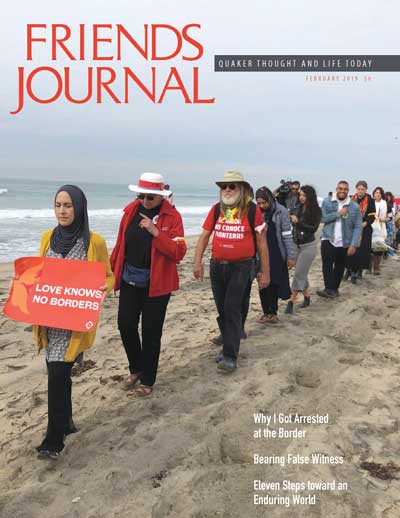In his time, Jesus took the concept of forgiveness to a dramatically new level. Jesus went beyond the traditional forgiving of friends and relatives. He asked us to love our enemies and to pray for those who persecute us (Matt. 5:43-44).
Jesus told us to harm no one, and taught by his example. Even as Jesus’s life was threatened, Jesus rebuked his disciple for cutting off a soldier’s ear, which Jesus then healed. He taught his followers to “turn the other cheek.” Not only is this not “the survival of the fittest” or “an eye for an eye,” it went even further than “love your neighbor as yourself” (Lev. 19:18 and Matt. 19:19). Jesus said that we must love everyone, even our enemies.
Hebrew heritage teaches us to treat everyone with kindness. Exodus 23:4-5: “When you come upon your enemy’s ox or donkey going astray, you shall bring it back. When you see the donkey of one who hates you lying under its burden and you would hold back from setting it free, you must help to set it free.” And from Proverbs 25:21: “If your enemies are hungry, give them bread to eat: and if they are thirsty, give them water to drink.”
Going beyond kindness and having experienced God’s love, Jesus told us to love our enemies because Jesus recognized that God loves everyone. Jesus pronounced that God makes the “sun rise on the evil and on the good, and sends rain on the righteous and on the unrighteous” (Matt. 5:45). God “is kind to the ungrateful and the wicked” (Luke 6:35).
As if loving one’s enemies is not enough, Jesus told us that we must care for society’s outcasts. Jesus healed those who would otherwise have been failures in society: the blind, the crippled, and the sick. He promoted the well-being of the oppressed: women, children, foreigners, and the poor. He showed kindness to the hated: tax collectors and prostitutes. While healing, Jesus announced that one’s sins were forgiven (Mark 2:1-12). Jesus knew that God had already forgiven us. Jesus simply informed us that we were already forgiven.
For Jesus, forgiveness became a shortcut to loving everyone. If we believe, as Jesus did, that God loves all of us, whether we are good or bad, rich or poor, then we realize that God knows fully why each of us behaves as we do. Such depth of understanding requires time, intimacy, and historical knowledge—all of which God has. If we had the time, the intimacy, and the historical knowledge that God has, then we would fully understand everyone—even our enemies—and we would love them, as God does.
If we believe that God loves all of us unconditionally because God thoroughly understands all of us, then we do not have to do all of the Godly work of thoroughly understanding others in order to love them. This is a shortcut to forgiveness: we only need to trust that God understands and loves the enemy anyway.
Jesus demonstrated that forgiveness works on a personal level, but how do we address societal and world problems?
Jesus was committed to what we today call nonviolent resistance. Jesus was nonviolent because violence hurts people, and every person’s pain matters because, as Quakers also believe, every person matters. Martin Luther King Jr. and Mohandas Gandhi employed this practical Christology in their peace movements. Paradoxically, nonviolence is a realistic solution to problems of violence because violence creates more violence and nonviolence limits violence. But how do we do this?
In The Powers That Be, Walter Wink proposed: “I don’t believe that nonviolence is something you can arrive at rationally. We can develop it as a spirituality and can obtain the grace necessary to practice it, but not as a result of reason. Not that it is anti-reason, but that it is not natural. The natural thing to do when somebody hits you is to hit them back.”
Nonviolence does not mean that we do not resist evil. On the contrary, we resist evil with all our might, while trying not to hurt anyone. When principled and governed by the rule of humane law, nonviolent governmental policies and policing assist in the reduction of violence.
Christianity, at its best and despite its bloody and mostly disappointing history, still attempts to champion forgiveness and nonviolence. To this day, the message of forgiveness has not been emphasized as much in any other religious tradition as it has been in Christianity. Although challenging, forgiveness and nonviolence are the only civilized way forward, the only way to peace on earth and goodwill toward humankind.




Comments on Friendsjournal.org may be used in the Forum of the print magazine and may be edited for length and clarity.